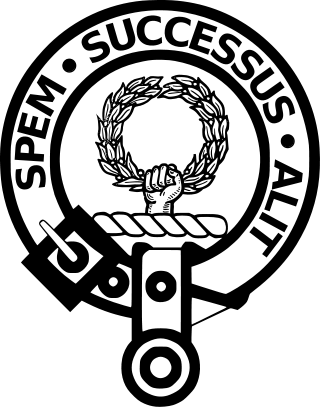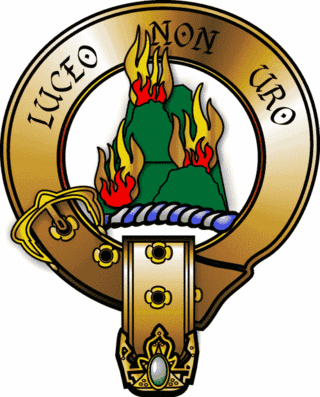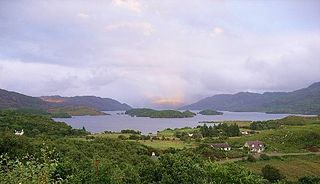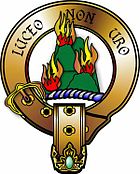
Clan Ross is a Highland Scottish clan. The original chiefs of the clan were the original Earls of Ross.

Clan Donald, also known as Clan MacDonald or Clan Mc Donald, is a Highland Scottish clan and one of the largest Scottish clans. The Lord Lyon King of Arms, the Scottish official with responsibility for regulating heraldry in that country, issuing new grants of coats of arms, and serving as the judge of the Court of the Lord Lyon, recognises under Scottish law the High Chief of Clan Donald. Historically the chiefs of the Clan Donald held the title of Lord of the Isles until 1493 and two of those chiefs also held the title of Earl of Ross until 1476. Queen Mary of Denmark is member of Clan Donald.

Clan Mackenzie is a Scottish clan, traditionally associated with Kintail and lands in Ross-shire in the Scottish Highlands. Traditional genealogies trace the ancestors of the Mackenzie chiefs to the 12th century. However, the earliest Mackenzie chief recorded by contemporary evidence is Alexander Mackenzie of Kintail who died some time after 1471. Traditionally, during the Wars of Scottish Independence, the Mackenzies supported Robert the Bruce, but feuded with the Earls of Ross in the latter part of the 14th century. During the 15th and 16th-centuries the Mackenzies feuded with the neighboring clans of Munro and MacDonald. In the 17th century the Mackenzie chief was made Earl of Seaforth in the peerage of Scotland. During the Scottish Civil War of the 17th century the Mackenzies largely supported the Royalists. During the Jacobite rising of 1715 the chief and clan of Mackenzie supported the Jacobite cause. However, during the Jacobite rising of 1745 the clan was divided with the chief, Kenneth Mackenzie, Lord Fortrose, supporting the British-Hanoverian Government and his relative, George Mackenzie, 3rd Earl of Cromartie, supporting the Jacobites.

Clan Mackay is an ancient and once-powerful Highland Scottish clan from the far North of the Scottish Highlands, but with roots in the old Kingdom of Moray.

Clan MacDonell of Glengarry, also known as Clan Ranald of Knoydart & Glengarry is a Highland Scottish clan and is a branch of the larger Clan Donald. The clan takes its name from River Garry where the river Garry runs eastwards through Loch Garry to join the Great Glen about 16 miles (25 km) north of Fort William, Highland. The progenitor of the MacDonells of Glengarry is Reginald, 4th great-grandson of the warrior Somerled.
John of Islay (1434–1503), Earl of Ross, fourth Lord of the Isles, and Mac Domhnaill, was a pivotal figure in late medieval Scotland: specifically in the struggle for power with James Stewart, James III of Scotland, in the remoter formerly Norse-dominated regions of the kingdom. His defeat in this conflict led to rebellion against John by his illegitimate son Angus Óg, resulting in the defeat of John's fleet at the Battle of Bloody Bay in the early 1480s. Thereafter and until his death in 1503 John remained an inconsequential figure while, until his murder in 1490, Angus continued to dominate the affairs of Clan Donald. In 1493 James IV brought the Lordship of the Isles to an end.

Alexander of Islay or Alexander MacDonald was a medieval Scottish nobleman who succeeded his father Domhnall of Islay as Lord of the Isles (1423–1449), later rising to the rank of Earl of Ross (1436–49). His lively career, especially before he attained the earldom of Ross, led Hugh MacDonald, the 17th century author of History of the MacDonalds, to commemorate him as "a man born to much trouble all his lifetime". Alexander allied himself with King James I of Scotland against the power of the Albany Stewarts in 1425 but, once the Albany Stewarts were out of the way, Alexander quickly found himself at odds with the new king. War with King James would initially prove Alexander's undoing, and would see the King's power in Scotland greatly increased, but at the Battle of Inverlochy Alexander's army prevailed against the forces of the King. Alexander died in 1449, having greatly extended his family's landed wealth and power. He was buried, not in the Isles of his ancestors, but at Fortrose Cathedral in his mainland Earldom of Ross.
Aonghas Óg was a Scottish nobleman who was the last independent Lord of the Isles. Aonghas became a rebel against both his father and the Scottish crown, in a civil clan war which would see the end of the independent Lordship of the Isles.

The Battle of Bealach nam Broig was fought between Scottish clans from the lands of north-west Ross, against north-eastern clans of Ross who supported the Earl of Ross. The actual date of the battle is debated, it probably occurred in 1452 but the Conflicts of the Clans suggests a date as early as 1299.

The Battle of Drumchatt was a Scottish clan battle that took place in 1497. The Clan Mackenzie and possibly the Clan Munro defeated the Clan MacDonald of Lochalsh at Drumchatt (Druimchat) or "the Cat's Back", a ridge to the southeast of Strathpeffer.

The Battle of Logiebride or Logie-Riach, also known as a Tumult in Ross was more of a small skirmish rather than an actual battle. The disturbance is said to have taken place on 4 February 1597 at the Logie Candlemas market near Conan House between men of the Clan Mackenzie against men of the Clan Munro and the Bain family of Tulloch Castle.

The Battle of Tuiteam Tarbhach was a Scottish clan battle in which the Mackays wiped out raiders from the Clan MacLeod of Lewis who were returning from an attack on Mackay land in Strathnaver. The Mackays caught up with the raiders on the north bank of the River Oykel some three miles west of where the river joins the River Cassley at the head of the Kyle of Sutherland. The battle probably took place in 1406, but the date is uncertain from the manuscripts.

The Battle of Dingwall was a Scottish clan battle said to have taken place in the year 1411, in Dingwall in the Scottish Highlands. It was fought between the Clan Mackay and the Clan Donald.
Alexander Mackenzie, known as "Ionraic", traditionally counted as 6th of Kintail, was the first chief of the Clan Mackenzie of whom indisputable contemporary documentary evidence survives. During his long life, he greatly expanded his clan's territories and influence.

The Battle of Blar na Pairce was a Scottish clan battle that took place just outside Strathpeffer some time between 1485 and 1491. It was fought between men of the Clan Donald or MacDonald and the Clan Mackenzie.

The Battle of Morar was a Scottish clan battle fought in 1602, near Loch Morar, in the Scottish Highlands. It was fought between the Clan MacDonell of Glengarry against the Clan Mackenzie who were supported by men of the Clan Ross and Andrew Munro of Novar.

Dingwall Castle was a medieval fort and royal castle in the town of Dingwall, eastern Ross-shire, Scotland.
Sir William Munro of Foulis was a Scottish Knight and Scottish clan chief of the highland Clan Munro. He is by tradition the 12th Baron of Foulis and 15th overall chief of the clan. However, he is actually only the 5th chief of the Clan Munro who can be proved by contemporary evidence.
Angus Du Mackay, 7th of Strathnaver was the seventh chief of the Clan Mackay, a Highland Scottish clan. He is recorded in the 15th-century Scottish chronicle, Scotichronicon, as Enneas-en-Imprissi meaning Angus the Absolute due to his power of commanding 4000 men.
Lachlan Mor Mackintosh, 16th of Mackintosh was the chief of the Clan Mackintosh, a Scottish clan of the Scottish Highlands. He was also chief of the confederation of clans that was known as the Clan Chattan.















